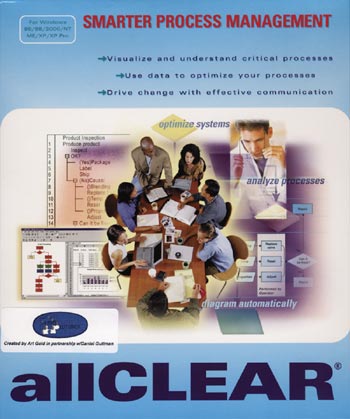 allCLEAR
6.1 allCLEAR
6.1
Proquis Inc.’s flowcharting
and analysis software, allCLEAR v. 6.1, is positioned somewhere
between a standard flowcharting package and process simulation
software. It does, in fact, prove to be a capable flowcharting
package with some useful process simulation features. And
although it lacks the robustness of a true simulation package,
allCLEAR’s analysis and simulation allow users to
identify areas for improvement for much less than the cost
of a true simulation package.
One of allCLEAR’s strong points is its capability
to generate flowcharts with only a typed-in list of steps.
No arcane language here; just learn a few simple rules (e.g.,
you must put some sort of punctuation at the end of every
line), and then just type a word or phrase that describes
each step. The flowchart draws itself. Although it’s
possible to do just about everything using the software’s
built-in text editor, it’s easier to input the steps
using the editor and then use the graphical tools to color,
highlight and format the resulting flowchart.
For the visually oriented, allCLEAR offers the usual set
of graphical flowcharting tools. The user drags and drops
diagram elements from a diagramming palette onto the worksheet.
When an element is placed on top of an existing element,
allCLEAR automatically draws the connecting line and properly
aligns the elements, simplifying the drawing task. Users
simply double-click an element or line to edit its text.
The diagramming palette includes not only single flowcharting
elements but also “clusters,” or common combinations.
For instance, rather than having to place a decision box
and two branch steps for “yes” and “no,”
you simply select an “if” cluster and place
it. The software offers a variety of cluster types, including
decisions (if), cases (three or more decisions), loops,
trees and more.
Another useful allCLEAR feature is its ability to link
multiple flowcharts. A user can create several flowcharts,
each on its own layer, in a single allCLEAR file. Each flowchart
is viewed and edited separately. However, you can link between
elements of each flowchart to create a general process flowchart,
from which you can drill down for a more detailed flowchart
at a specific step. Unfortunately, you cannot create this
type of linkage to another allCLEAR file--only within layers
of the current file. However, you can attach any kind of
document to any step.
The analysis feature is a means of looking at the effect
of any path through a process in terms of cumulative time,
cost or other chosen metric. The user creates a set of variables
that will be used throughout the process and, at each step,
assigns values to those variables. Once the user completes
inputting the data, allCLEAR analyzes all possible paths
through the process and shows the results of taking each
path. The results of each path are viewed side-by-side and
can be sorted by one of the user-defined variables. This
makes it easy to see which route through a process takes
the most time or costs the most money.
Of more use is allCLEAR’s simulation function. The
user sets probabilities that a particular branch will be
taken and then selects the number of runs and the number
of cycles per run. After running the simulation, the user
can examine the averages of variables across all runs. If
the probabilities have been entered correctly at each decision
point, these average values should provide a fairly accurate
idea of the process’s performance. From here it’s
possible to do what-ifs or change the value of a key variable
and rerun the simulation to see different effects.
The software’s HTML export function works well.
Flowcharts are converted to JPGs, complete with links to
subcharts or attachments if they were included in the original
allCLEAR layout.
Although the basic operation of allCLEAR is intuitive,
it’s worth spending the half hour it takes to run
through the included Quick Start tutorial. It’s welldone,
stepping you through all the basic features of the program.
Overall, allCLEAR is an easy-to-use and cost-effective
tool. For those who want some process simulation without
a big price tag, allCLEAR is worth a look.
Dirk Dusharme is Quality Digest’s technology
editor.
allCLEAR 6.1
Requirements: 16 MB RAM, 50 MB hard disk
space, Windows 95 or newer, Microsoft Internet Explorer
or Netscape Navigator for HTML export.
Price: $499 for stand-alone version. Network
version pricing is based on number of licenses and starts
at $695.
Contact:
|